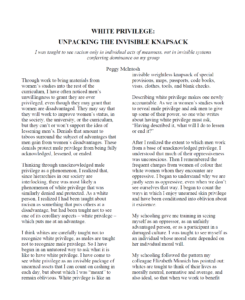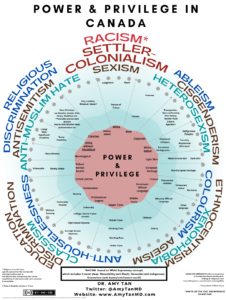Time to take (on) power!
Module 4 presents articles, tools and resources to help you think about the role that power and privilege play in our world, workplace and union education work.
To prepare, complete the following steps:
- Step 1: Read about white privilege
- Step 2: Explore a map of power and privilege in Canadian society, and
- Step 3: Learn about the danger of looking at the world thinking that a single story explains everything.
Read and watch below!
If you get stuck or have any questions, reach out. We’re here to help. Contact: education@cupe.ca
Step 1: Read about unlearning white privilege
“I was taught to see racism only in individual acts of meanness, not in invisible systems conferring dominance on my group,” writes Peggy McIntosh in this classic 1990 article.
Step 2: Explore the role that power and privilege play in our society
Dr. Amy Tan is an academic family and hospice palliative care physician in Calgary. Alarmed at the rise of organized white supremacy and the disproportionate impact of COVID-19 on racialized communities, Dr. Tan produced an excellent resource for contemplating how power and privilege operate in the Canadian context.
Click here to review “Power and Privilege in Canada”
Dr. Tan’s graphic, and accompanying text, invites us to see who has power and privilege, and who doesn’t. She builds on the work of Black feminists by explaining how identities and oppressions overlap: how they “intersect”, or, how they are intersectional.


